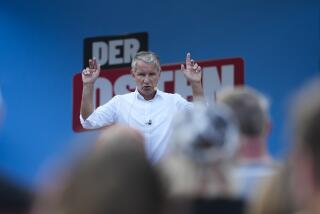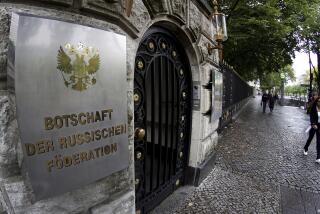Europe : Germans Edgy Over Russian Shift to Right : After extremistâs unexpected electoral victory, Bonn is likely to push for stronger European links with Moscow. It hopes to bolster Yeltsin and other political reformists.
BERLIN â German Foreign Minister Klaus Kinkel travels to Moscow today to meet his Russian counterpart, Andrei V. Kozyrev, on a visit initially conceived as an informal get-together.
The format for the session, however, has quickly changed.
Amid the aftershocks of last Sundayâs Russian parliamentary elections, the meeting will be anything but low-key--for Kozyrev or for the Germans, who see the victorious Russian extremist Vladimir V. Zhirinovsky as the incarnation of their ultimate nightmare: an aggressive Russia in the hands of an unstable xenophobe.
Initially at least, Bonn is likely to react to events on two fronts, both geared to strengthening Russian President Boris N. Yeltsin and reformers such as Kozyrev:
* German officials say they plan to step up pressure in the 12-nation European Community to get swift approval for an accord to intensify political links with Moscow, open markets to Russian goods and raise the prospect of an eventual free-trade agreement between Russia and the Community--one of the worldâs biggest, richest consumer markets.
That agreement should have been ready for signing last month when Yeltsin visited Brussels. But opposition from some EC countries, reluctant to open their markets to inexpensive Eastern goods, has slowed progress.
* Chancellor Helmut Kohl also is likely to take a softer line at next monthâs NATO summit in Brussels on the sensitive issue of expanding the Atlantic Alliance to include Poland, Hungary and the Czech Republic--a move once pushed hard by the Germans but opposed by Yeltsin.
Although some German security specialists argue that Zhirinovskyâs rise actually strengthens the case for accepting these nations into the alliance, senior German officials now seem to be more worried about adding to pressures already on Yeltsin.
âWe canât let him think heâs got a veto right, but nowâs not the time for new members,â one Foreign Ministry official declared.
For Germany, such moves would be an extension of existing policy in which the country has consistently pushed its allies to do more for Moscowâs reformers. It is a policy highly popular at home. Bonn was among the first and loudest Western cheerleaders for Mikhail S. Gorbachevâs early attempts to transform Soviet communism.
When the former Soviet leader visited Bonn in June, 1989, the reception was euphoric to the point of embarrassment.
When famine threatened the Soviet Union 18 months later, Germans responded with an unprecedented outpouring of generosity and an avalanche of food packages.
Meantime, the German government has provided Moscow with more than $50 billion in hard-currency aid--all in the name of promoting a stable transition to democracy and building strong Russo-German links.
Zhirinovskyâs emergence is exactly what Germany wanted to prevent. His comments and his platform stir a deep, visceral fear among Germans, a people especially susceptible to bouts of angst when talk turns to threats from the East.
âBack to the Futureâ was the headline in a front-page commentary published in last Tuesdayâs editions of the respected Berlin daily, Der Tagespiegel.
For two nations that have fought twice this century at a cost of almost 30 million lives, the thought of an aggressive neighbor is not a happy one.
Zhirinovskyâs menacing statement that he would âcreate new Hiroshimas and Nagasakisâ at the slightest German provocation was made more than two years ago. But the German media headlined the remark this week in post-election reports.
Zhirinovskyâs outspoken desire to forge an alliance with the extreme German right has also made the leadership here nervous.
Zhirinovskyâs rambling interview in the current edition of the German extremist National Zeitung, which includes thinly veiled references to Germany and Russia carving up Poland again, is not expected to appeal to more than a tiny minority in a country so indoctrinated against militarism that it agonizes over deploying troops for even the most humanitarian of U.N. peacekeeping activities.
Threat From the East
Vladimir V. Zhirinovskyâs emergence stirs up deep fears among Germans.
Germans see Zhirinovsky as a concern because. . .
He may form ties with German radicals
He has made outlandish statements, saying he would create new âNagasakis and Hiroshimasâ at the least provocation from Germany
To neutralize him and his influence, they will. . .
Boost support for Russian reformers
Offer more aid to Russia by opening European markets
Slow up efforts to add members to NATO, a longtime Russian adversary
More to Read
Sign up for Essential California
The most important California stories and recommendations in your inbox every morning.
You may occasionally receive promotional content from the Los Angeles Times.










